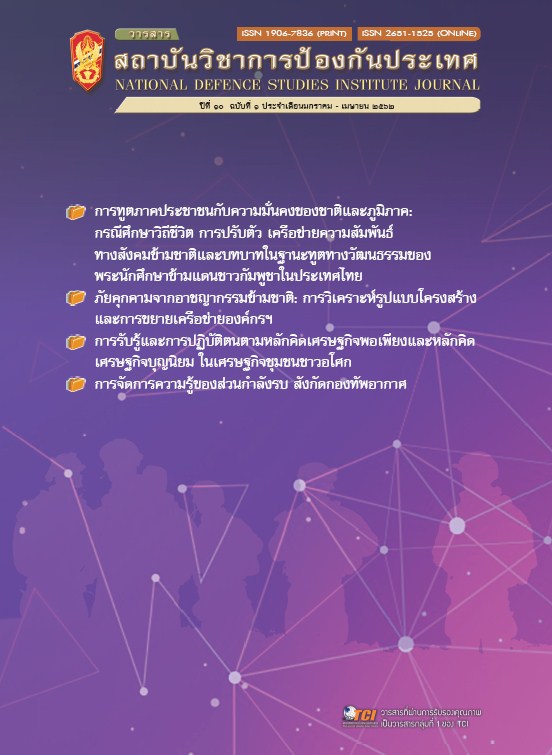Development of a Sustainable Internal Quality Assurance System Integrated with Regular Work for Undergraduate Institution of National Defence Studies Institute, Royal Thai Armed Forces Headquarters : Causal Factors Affecting Internal Quality Assurance Operations and Quidelines for Sustainable Quality Assurance by Integrating with Normal work
Main Article Content
Abstract
The purpose of this research is to develop a sustainable internal quality assurance system that is integrated with the regular work for the undergraduate institution of the National Defence, Studies Institute, Royal Thai Armed Forces Headquarters. This presentation is a result of the analysis of the causal factors that affect the performance of internal quality assurance and the analysis of the internal quality assurance guidelines in a sustainable way that integrated with the regular work. The sample is the staff in the undergraduate institutions of the National Defence Studies Institute, Royal Thai Armed Forces Headquarters number of 402 for responding questionnaires and 30 for the interview and focus group. Instruments used in this study were questionnaires with the 5 level rating scale about factors that affect performance of internal quality assurance and structured interview about internal quality assurance guidelines in a sustainable way that integrated with the regular work. Data were analyzed using descriptive statistics: mean, standard deviation, and structural equation model by using the LISREL program and analyzing data from interviews and focus groups with content analysis.
The research found that the internal quality assurance system factor have the most impact on the performance of internal quality assurance, followed by the organizational context and staff factors. The results of the path analysis found that the performance of internal quality assurance factor was effected by organizational context and the internal quality assurance system factors with the size of effect of 0.45 and 0.20, respectively. The internal quality assurance system factor was directly affected by organizational context and staff factors which the size of effects were 0.30 and 0.43, respectively. The database and information system factor was directly effected by organizational context and administrator factors which the size of effects were 0.52 and 0.36, respectively. For the guidelines for sustainable internal quality assurance system that integrated with the regular work found that the development of knowledge and understanding of quality assurance for personnel has the most important, followed by the administrator realizes the value of educational quality assurance and has the ability to manage the organization.
Article Details
The articles, images, tables, graphs, written content, and opinions published in this journal are solely those of the authors and do not necessarily reflect the views or positions of the National Defence Studies Institute or its academic affiliates.
References
กิตติพงษ์ หาตรงจิตต์. (๒๕๕๐). การศึกษาปัจจัยที่ส่งผลต่อการดำเนินการประกันคุณภาพการศึกษาของโรงเรียนประถมศึกษา
สังกัดสำนักงานเขตพื้นที่การศึกษาจังหวัดอุดรธานี (ปริญญาครุศาสตรมหาบัณฑิต สาขาบริหารการศึกษา).
มหาวิทยาลัยราชภัฏอุดรธานี.
จิราภรณ์ กันทะไชย. (๒๕๕๗). ปัจจัยเตรียมความพร้อมของบุคลากรที่มีผลต่อความสำเร็จในการประกันคุณภาพการศึกษา
ของวิทยาลัยเทคโนโลยีอาชีวศึกษาเอกชน สังกัดสำนักงานคณะกรรมการส่งเสริมการศึกษาเอกชน จังหวัดชลบุรี
(วิทยานิพนธ์ปริญญาการศึกษามหาบัณฑิต สาขาวิชาวิจัย วัดผลและสถิติการศึกษา). มหาวิทยาลัยบูรพา.
ณฐมนวรรณ ศิริสุขชัยวุฒิ. (๒๕๕๒). ปัจจัยที่ส่งผลต่อคุณภาพของระบบประกันคุณภาพภายในสถานศึกษาขั้นพื้นฐาน
ที่ได้รับการรับรองมาตรฐานการศึกษา ในเขตภาคเหนือตอนล่าง. กรุงเทพฯ: เคมบริดจ์ เอ็ดยูเคชัน.
บุญเกิด เมืองแสน. (๒๕๕๒). ปัจจัยที่ส่งผลต่อผลการประเมินคุณภาพภายนอกโรงเรียนพระปริยัติธรรมสังกัดสำนักงาน
พระพุทธศาสนาแห่งชาติ (วิทยานิพนธ์การศึกษามหาบัณฑิต สาขาวิชาวิจัยและประเมินผลการศึกษา).
มหาวิทยาลัยนเรศวร.
พงศ์เทพ จิระโร. (๒๕๔๖). การพัฒนาระบบประกันคุณภาพภายในสำหรับการศึกษาเฉพาะทางของกองทัพเรือ (ดุษฎีนิพนธ์
ครุศาสตรดุษฎีบัณฑิต, สาขาการวัดและประเมินผลการศึกษา). จุฬาลงกรณ์มหาวิทยาลัย.
มัฮดี แวดราแม. (๒๕๕๕). การพัฒนารูปแบบการประกันคุณภาพการศึกษาภายในที่บูรณาการกับงานปกติ สำหรับ
คณะครุศาสตร์/ศึกษาศาสตร์ (วิทยานิพนธ์ปริญญาดุษฎีบัณฑิต สาขาวิชาการวัดและประเมินผลการศึกษา
ภาควิชาวิจัยและจิตวิทยาการศึกษา). จุฬาลงกรณ์มหาวิทยาลัย.
สุวิมล ว่องวาณิช. (๒๕๔๓). รายงานการวิจัยและพัฒนาระบบประเมินผลภายในของสถานศึกษา. กรุงเทพฯ: พิมพ์ดี.
อวยพร สดใส. (๒๕๔๙). ความรู้ ทัศนคติ และการมีส่วนร่วมในการประกันคุณภาพการศึกษาของบุคลากร คณะมนุษยศาสตร์
และสังคมศาสตร์ มหาวิทยาลัยบูรพา ชลบุรี. มหาวิทยาลัยบูรพา.
Bhola, H. S. (1984). Building a Built-in Evaluation System: A Case in Point. Education Indiana University.
From https://files.eric.ed.gov/fulltext/ED256779.pdf.
Krejcie, R.V. & Morgan, D.W. (1970). Determining Sample Size for Research Activities. Educational and
Psychological Measurement, 30(1).
Gbemi Peter Moye. (2014). Effects of School Variables on the Assurance of Quality Learning Outcomes
in Schools. International Journal of Learning, Teaching and Educational Research. 9(1).
Stufflebeam, D. L. & Shinkfield, A.J. (2007). Evaluation Theory, Model and Applications. San Francisco:
John Wiley & Son, Inc.
William A. S. (1998). Beyond ISO 9000: How to Sustain Quality in Dynamic World. New York: AMACOM.


